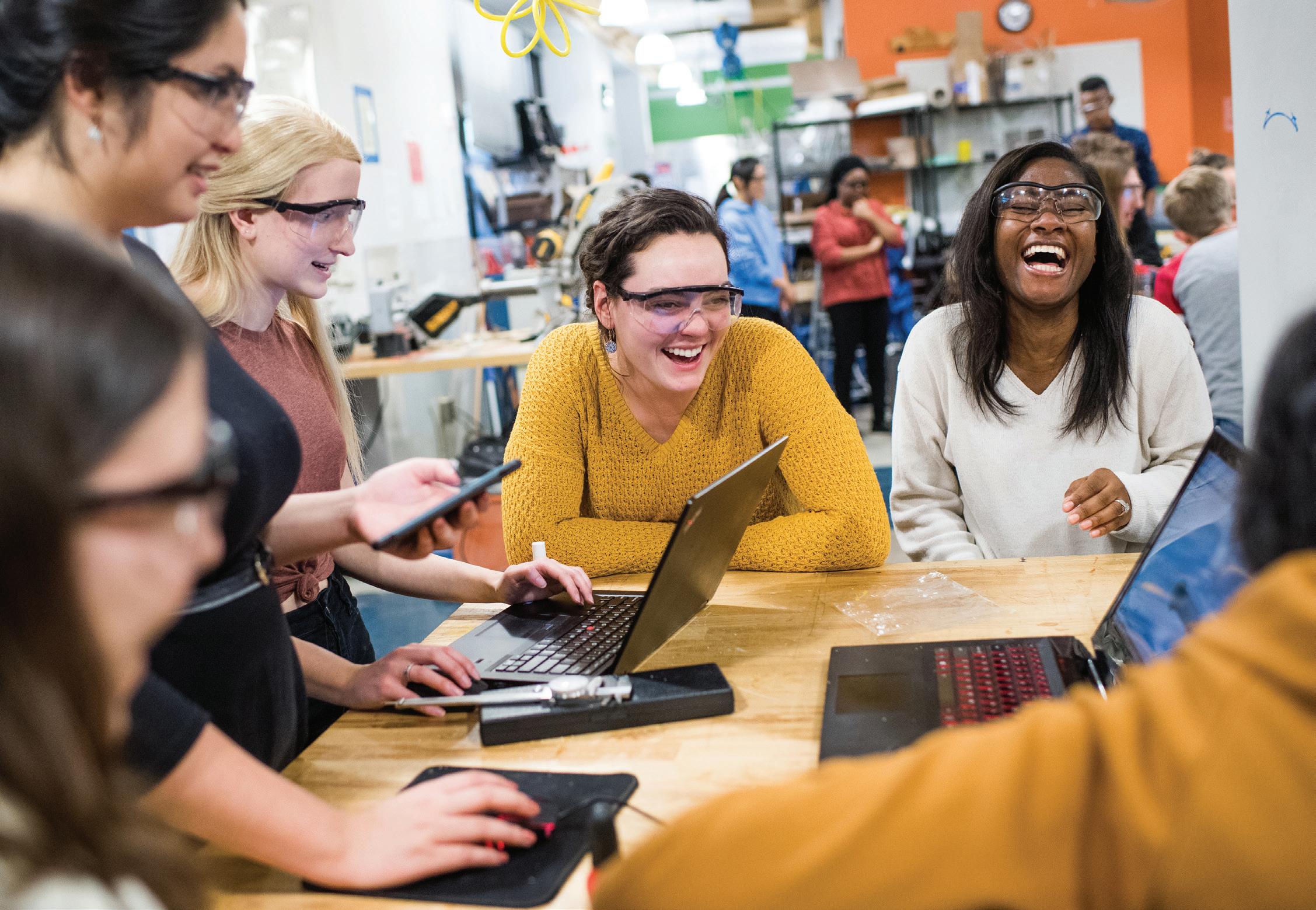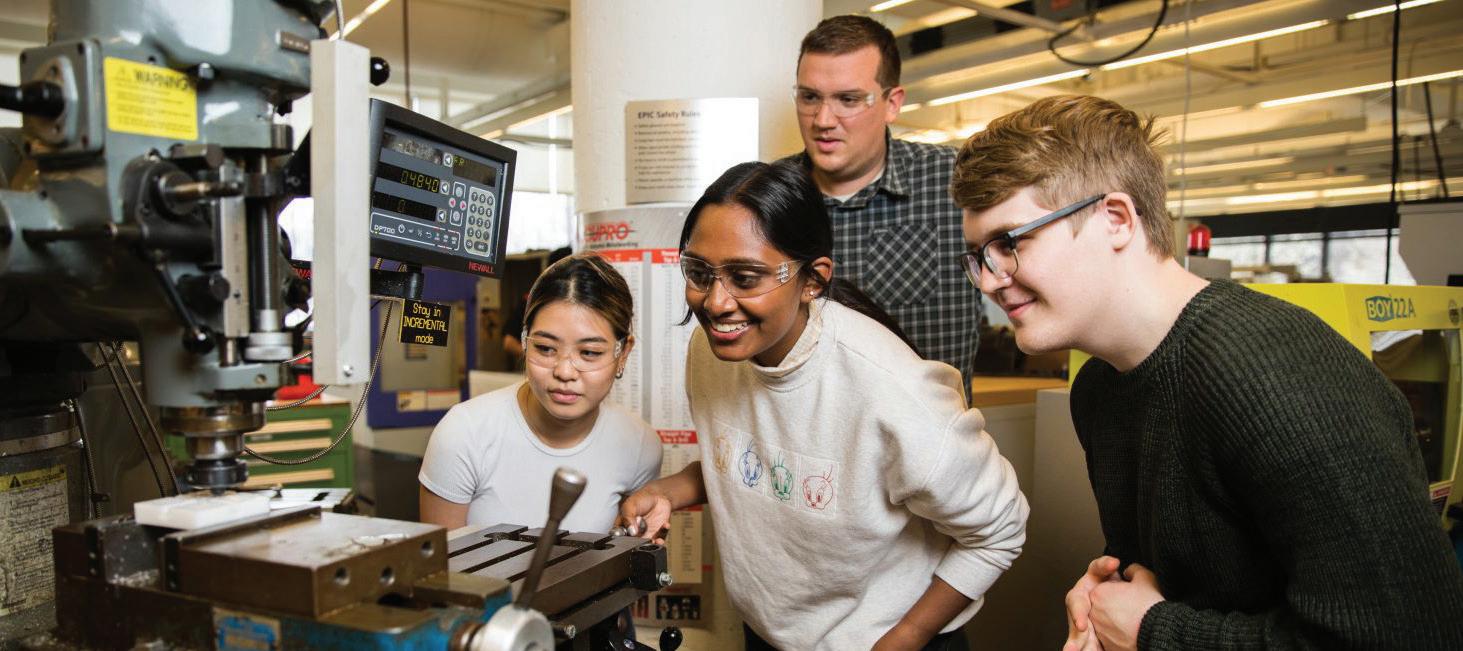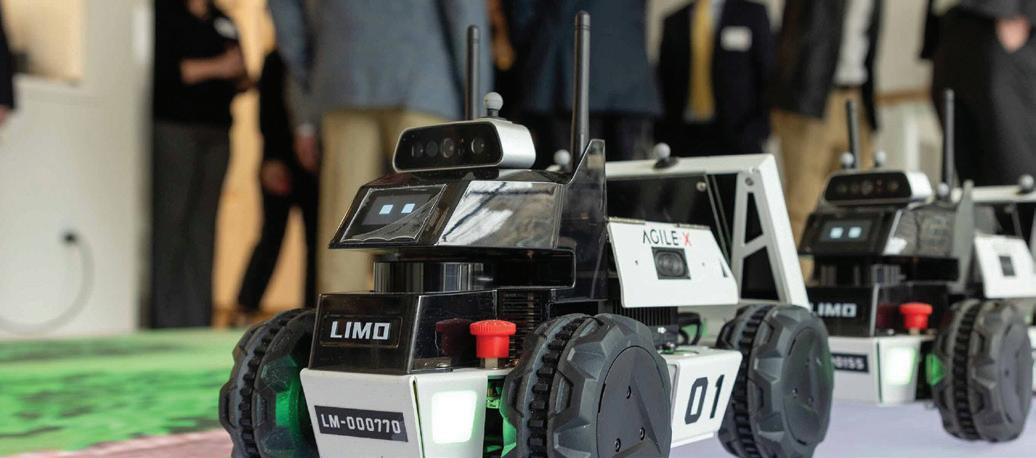BU ENGINEERING: CREATING SOLUTIONS IN SERVICE TO SOCIETY.
Engineering discoveries transform lives. They have revolutionized medical treatments, the speed and flexibility of communication and transportation, and technologies for a more sustainable world.
The engineering profession has unrivaled potential for creating opportunities for individuals and their communities by enabling people to live healthier and more productive, connected, and fulfilling lives, and opportunities for communities and entire nations by feeding local and global economies with innovation. The Boston University College of Engineering is uniquely positioned to be a multiplier for this kind of impact.
#31 among all graduate engineering programs in the US*
#16 in research expenditures per faculty member among all US engineering schools*
$150M in engineering-related research expenditures in 2023*
95% of the Class of 2023 was employed or in graduate school within six months of graduation
$84,277—Class of 2023 median starting full-time salary
247 high-impact research awards
*U.S. News rankings
Engineered for Impact
Our Trajectory
Established only 60 years ago, BU Engineering is a young college on a rapid ascent. Our engineering curriculum draws on Boston University’s rich intellectual wellspring, attracting students curious to explore questions that cross disciplinary boundaries, eager to immerse themselves in a city of technological innovation, and committed to making a positive difference in the world. The college has grown quickly in recent years: the number of undergraduate students has increased to nearly 1,800, over one-third of whom are women (10 percent higher than the national average); the ranking in U.S. News & World Report has jumped 23 spots since 2005; and our $150M in research expenditures annually places us 16th among all engineering schools in the nation in research dollars awarded per faculty member.
Embedded in the ethos of BU Engineering is a calling to use our engineering training to create opportunities for all. BU Engineers are Societal Engineers: engineers committed to creating solutions in service to society. They are challenged not simply to solve problems but to solve the problems that matter the most to individuals, their communities, and the world’s future. BU Engineers also recognize that solving these important problems requires that engineers embrace the opportunity to work with experts from other domains in the sciences, arts, and humanities, as well as business, law, medicine, public health, and more.
Researching and Learning Together
Unlike our peers, BU Engineering is, by design, organized around a small number of fluid academic departments rather than more-traditional silos. Ours is a structure that fosters and celebrates collaboration and cross-disciplinary research and learning. Within this environment, students are guided to make connections between their coursework and real-world problems; combined with an emphasis on hands-on learning, this naturally leads to developing confidence, intellectual agility, and a knack for creative problem-solving.
Nurturing such an environment begins with our faculty. BU Engineering faculty are internationally recognized for their path-breaking discoveries, teaching and mentorship, prestigious awards (including Guggenheim and Sloan Fellowships), and memberships in the National Academies of Science, Engineering, Medicine, and Inventors. With cross-disciplinary work and collaboration as the organizing principle of BU Engineering, faculty leverage the breadth and depth of Boston University to innovate in research and education, advancing and even creating new fields such as
Established in 1963
1,794 undergraduate students
1,066 graduate students
145 faculty
23,561 global alumni
4 undergraduate majors
13 master’s & PhD programs
21 research centers & institutes
BU Engineering Snapshot
Convergent Research Themes
1. Energy, sustainability, and climate to rapidly and safely meet the world’s future energy needs
2. Neuroengineering and neuroscience to advance diagnosis and treatment of neurological disorders and injuries
3. Photonics and optical systems to engineer light for revolutionizing communications, imaging, and computing
4. Intelligent, autonomous, and secure systems representing next-generation robots, trustworthy AI, and resilient urban infrastructure
5. Materials by design to design and manufacture smarter materials, for needs ranging from space exploration to healthcare to natural disaster recovery
6. Synthetic biology, tissue engineering, and mechanobiology to harness cutting-edge biological discoveries to save lives and improve quality of life
These six themes represent a confluence of bold ideas by world-renowned faculty. Investment in them, their research, and the students they mentor on these projects will enable the discoveries that shape our world for generations to come.
neurophotonics and synthetic biology that expand the power and potential of engineering
BU Engineering faculty also play leadership roles in University-wide initiatives that bring together physicists, biologists, chemists, clinical researchers, policymakers, and others to solve complex problems, for instance:
• how to generate, store, and transmit clean energy efficiently (Institute for Global Sustainability)
• how to harness the strengths and guard against the unintended consequences of intelligent systems (Hariri Institute)
• how to bioengineer a heart (Center in Cellular Metamaterials)
Their excellence attracts the best and brightest graduate students and postdocs, creating a vibrant community of researchers engaged in the pursuit of high-impact research in areas such as healthcare (creating organs on a chip, tackling health disparities, and engineering 3D bioprinted tissues) and sustainability (building more-sustainable batteries, novel carbon capture, and smart powergrid systems). Many of the innovations emerging from BU Engineering labs are being commercialized through faculty-held patents, licensing agreements, and start-ups in areas ranging from drug delivery (Beta Bionics) to skin cancer detection (DermaSensor) to next-generation magnetic resonance imaging (Primetaz).
Our Ambitious Vision
Under the leadership of Dean Elise Morgan, BU Engineering has set an ambitious goal for the next decade: to be consistently recognized as a global top-tier research and teaching institution, one that is the destination of choice for world-class faculty, students, staff, and external partners who are dedicated to societally driven engineering. While much has been accomplished in the last decade, realizing this vision will require continued work and investment in our community and in the research that will define the future. Investment cannot wait. From a global pandemic to the warming of our planet, the challenges we face—and the need for technically exceptional, well-rounded, and diverse engineering graduates—have never been greater.
Hands-On Engineering Education
Engineering Product Innovation Center (EPIC) is a 15,000-square-foot manufacturing makerspace facility in which BU students gain hands-on experience turning their ideas into reality. Under the guidance of expert teaching staff, students learn design, prototyping, and small-scale manufacturing.
Singh Imagineering Lab (SILab) is a highly visible makerspace at 44 Cummington Mall, where machines and resources are made available for innovation unconstrained by coursework. SILab empowers students to pursue their own ideas and designs.
Bioengineering Technology & Entrepreneurship Center (BTEC) is a bioengineering makerspace in which engineering students work directly on biological systems—from molecules to cells to tissues—develop biosensors, and immerse themselves in the datadriven world of digital and predictive medicine.
Robotics & Autonomous Systems Teaching and Innovation Center (RASTIC) is a state-of-the-art robotics teaching facility in which engineering students learn automation hardware and software and build robotics and self-driving vehicles.
Societally driven engineering begins with a focus on research impact. Our faculty and students work tirelessly to advance the research that will define the future, even when that means breaking some traditions in academia to create new and innovative communities of scholars. Our expansive portfolio of research projects exemplifies convergence, the coalescing of approaches from multiple disciplines to create entirely new and more powerful ways of solving the world’s grand challenges.
Taking a Convergent Approach
BU Engineering’s convergent approach to accelerating research impact is already bearing fruit. From growth in research funding, to national awards for our students, to winning high-profile grants for pioneering work at the interfaces of fields such as neuroscience and computing, evidence abounds of the potential to cement BU
Engineering’s unrivaled leadership in critically important areas such as engineering for health and robotics and intelligent systems. Our faculty and students are at the forefront of reengineering the immune system to fight cancer and speed healing, unlocking the mysteries of how the brain is wired, and repairing damaged tissues by using novel materials and turning cells into fleets of biological factories. Similarly, BU Engineers have consistently gained international recognition for their work in intelligent systems—robots and other engineered systems that use data-driven decision-making, learning, and adaptation to operate effectively and safely in complex, unpredictable environments. Amid the near-infinite number of applications of intelligent systems, we focus on the ones that address the greatest societal needs, including teams of robots that work collaboratively to distribute supplies in disaster areas, transportation
infrastructure that reduces congestion and diversifies energy sources, and communications methods that detect and thwart malicious behavior on the internet.
BU Engineering knows that the impact of our work will never reach its full potential without an unwavering commitment to inclusive excellence When talented engineers are not welcomed into the room because of preconceived notions and inequitable access, their perspectives are lost, perpetuating groupthink, dampening creativity, and slowing progress. BU Engineering’s Office of Outreach & Diversity is dedicated to fostering a culture of inclusion and belonging for our students, faculty, and staff through a variety of programming and initiatives—from expanding mentorship and peer advising, to supporting student affinity groups and developing our suite of K-12 outreach programs, to constructing vibrant and welcoming community spaces. These investments are contributing not only to a more inclusive academic environment but also to an enhanced engineering community working together to improve our world.
These foundations of research impact and inclusive excellence create fertile ground for an exceptional
student experience, one that goes beyond the confines of classrooms. Undergraduate and graduate students work side by side with one another and with faculty in our research labs. Our state-of-the-art innovation and makerspaces (see sidebar on page five above) challenge our students to synthesize concepts across different areas of engineering as they engage in hands-on learning and develop the grit that comes from seeing early ideas fail and new ones succeed. Experiential learning extends to our array of student clubs and engineering societies, such as the Mars Rover Club and Terrier Motorsport. These groups provide avenues for BU Engineering students to pursue their passions, learn from their peers, and build community. BU Engineering’s Career Development Office provides specialized advising to help our students explore their career options and effectively pursue jobs and internships, enabling them to bridge a rigorous education and a rewarding professional journey. Support for these hands-on, cocurricular, and professional development experiences is critical for expanding BU Engineering’s reputation for excellence in cutting-edge engineering education.
BU Engineering is about impact—on individuals, their communities, and the world. That means we attract a different kind of student, one who chooses BU because of their understanding of the extraordinary power and purpose of engineering to create opportunities for all.
—Elise Morgan, Dean of BU Engineering and Maysarah K. Sukkar Professor of Engineering Design & Innovation
Just as BU Engineering excels at working across disciplines, we value partnerships with society industry, government, neighborhood communities— as an imperative for making impact. BU Engineering sits at the epicenter of an exceptional ecosystem: a global city, a geographic region with unmatched high-tech and biotech industries, and a hub of local and national policymakers. Our research and educational programs have natural points of connection to all these assets, through frequent engagement with members of our industry advisory boards, robust technology transfer, programs with Boston Public Schools, and more. That depth of connection and honest exchange distinguishes us from our peers, an approach that allows BU Engineering to better prepare the next generation of engineers to design and create solutions to some of humanity’s most challenging problems.
An Invitation
BU Engineering’s rapid ascent is a testament to our vision, commitment, and talent. Investments in our key areas—research impact, inclusive excellence, the student experience, and partnerships with society—are critical for us to move forward at the pace that the pressing challenges in society demand. We cannot accomplish this feat alone. We seek the support of those who share our vision— BU Engineering as the destination of choice for world-class faculty, students, staff, and external partners who are dedicated to societally driven engineering—and we invite you to join us.
For more information, please contact:
engdean@bu.edu









